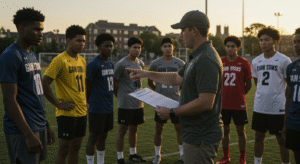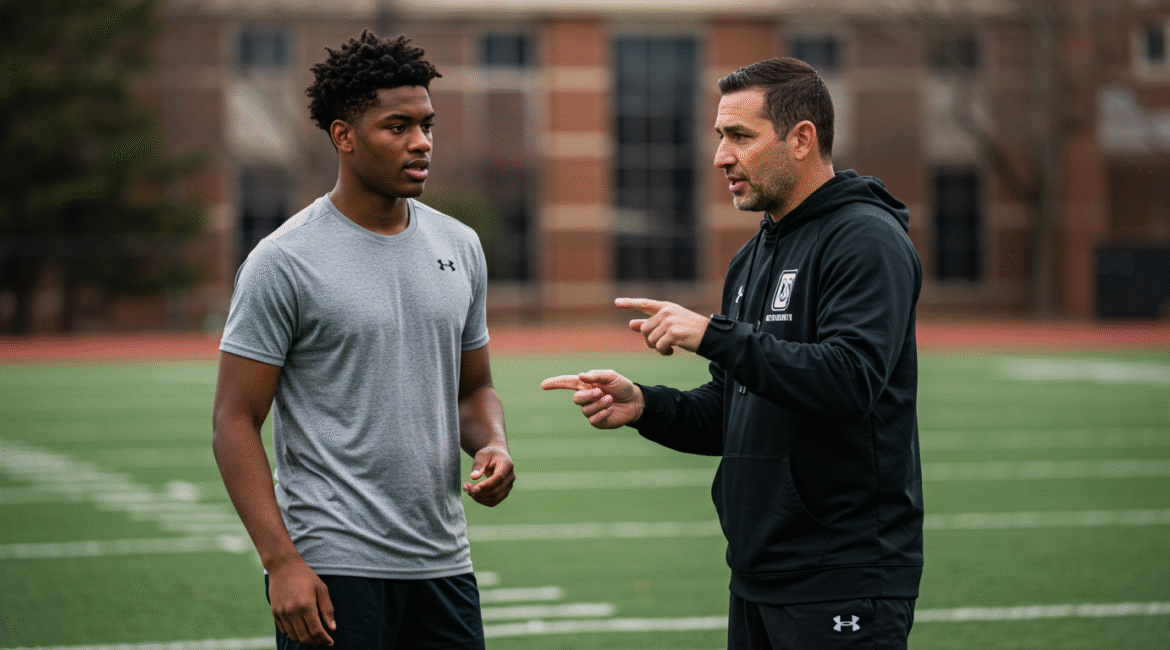The Game-Changing Secret Every High School Athlete Needs to Know
Picture this: Two players walk into a college coach’s office. Player A has jaw-dropping highlight reels, insane vertical jumps, and stats that make your head spin. Player B? Good—not great—numbers, but something else entirely that makes coaches’ eyes light up. Guess who gets the scholarship offer?
If you guessed Player B, you’re catching on to the recruiting world’s best-kept secret that’s finally going viral among student-athletes nationwide.
The Brutal Truth About What Really Gets You Recruited
Here’s what’s about to blow your mind: COACHABILITY = RECRUITABILITY. This simple equation is reshaping how smart athletes approach their recruiting journey, and it’s time you knew why coaches are obsessed with this one trait above all others.
Think about it from a coach’s perspective. They’re not just building a roster—they’re constructing a championship culture. They need players who won’t just perform when the lights are bright, but who will elevate everyone around them during those grueling 6 AM practices when nobody’s watching.
Your attitude in practice speaks louder than your stats on game day. Period.
The Four Pillars That Make Coaches Fall in Love With Athletes
1. Listen Without Ego
The greatest recruits I’ve seen? They park their pride at the door. When a coach gives feedback, they don’t get defensive or make excuses. They absorb it like a sponge. These athletes understand that every piece of criticism is actually a roadmap to their next level.
2. Apply Feedback Immediately
Here’s where most athletes fail. They nod during instruction but continue making the same mistakes. Coachable athletes are different—they implement changes instantly. Coaches notice this immediately because it shows genuine commitment to improvement.
3. Ask Questions to Improve
The athletes who ask “How can I get better at this?” or “What should I focus on during the off-season?” are the ones coaches remember. It demonstrates analytical thinking and hunger for growth that goes beyond natural talent.
4. Adapt When Things Get Tough
Sports are unpredictable. Coachable athletes don’t crumble when the game plan changes mid-game or when they’re moved to a different position. They embrace the challenge and find ways to contribute, showing mental toughness that translates to leadership potential.
Why This Changes Everything for Your Recruiting Journey
College programs are investing hundreds of thousands of dollars in scholarships. They’re not just buying your current abilities—they’re betting on your potential to grow, lead, and represent their program for four years. A coachable athlete with room to improve is infinitely more valuable than a talented prima donna who’s already peaked.
Consider the recruiting stories that shocked everyone: the “unknown” players who got full rides to Division I programs while flashier athletes went unnoticed. The difference? Coachability. These athletes showed coaches they were willing to be molded, coached, and developed into something special.
The Social Media Moment That’s Changing Recruiting
A recent post that went viral in the student-athlete community perfectly captured this shift: coaches are finally saying the quiet part out loud. They want athletes who possess a growth mindset, who see feedback as fuel rather than failure, and who understand that being the hardest worker in practice matters more than being the most gifted player on game day.
This isn’t just feel-good motivation—it’s strategic career advice. Developing these coachable traits can literally be the difference between riding the bench and earning a starting position, between getting overlooked and landing your dream scholarship.
Your Move: How to Become the Recruit Coaches Can’t Ignore
Start viewing every practice, every drill, every piece of feedback as an opportunity to showcase your coachability. Make it obvious that you’re the type of athlete who makes everyone around you better. Show coaches that you’re not just recruiting material—you’re championship culture material.
Here’s my challenge to you: What’s one area of your game where you’ve been resistant to coaching? How can you flip that mindset and turn it into your biggest recruiting advantage?
Drop a comment below and tell me: What’s the best coaching advice you’ve ever received, and how did it change your game? Your story might just inspire the next athlete to land their dream scholarship.
